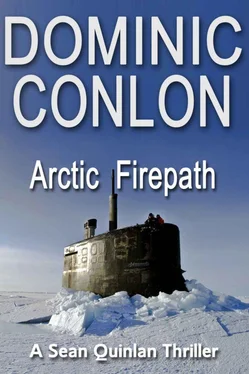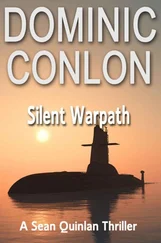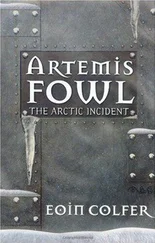‘Hello Vladislav. No, your request was understood. You wish to speak to the President. I regret to say that he is unavailable at present. Perhaps you could indicate the nature of the discussion, and I might be able to help?’
President Duskin leaned towards the microphone. ‘Mr Harris, you will gather I am in the same room as my colleague. I’m afraid we have little time. Unless we contact your President in the next five minutes, we will close this communication.’ The President noted the time. ‘The consequences of missing this opportunity would be dire.’
‘Just a second, Mr President. I will see what I can do.’
The conference phone went dead, indicating the Americans were transferring the connection. Within two minutes, the President was on the line.
‘Good morning Pavla. I understand you wanted to speak to me urgently?’ The calm and assured voice of President Donahue oozed from the speakers.
‘We do, Robert. We have a situation developing in the Arctic. When we last spoke I denied you access to our ship LK-80 to rescue the crew of your submarine. I told you that we would engage our own teams and make our own arrangements to save the men.’
‘That is correct, Pavla. However, when we contacted the Captain he offered the unconditional use of his ship for the rescue mission. We believed that circumstances had changed and his offer had the full weight of the Russian government behind it.’
Vladislav saw his President colour briefly.
‘I doubt the he made such an offer. If he did, he had no right. I am stunned by the unilateral action you have taken. It just shows how aggressive your American military really are.’
‘President Duskin.’ Donahue’s voice grew more clipped. ‘Our rescue team are there only after the most cordial of invitations from the person in charge. Perhaps you have forgotten that it was your icebreaker that caused the accident in the first place that has already resulted in the death of five men and the potential deaths of a hundred and twenty nine more.’
‘President Donahue. Your occupation of our ship is intolerable. You have created a major international incident, especially when we are already in the process of sending equipment and men to the site.’
‘Our submarine was deliberately rammed by the Russian icebreaker. If that is not a major diplomatic incident, what is? In any case,’ Donahue continued mildly, ‘the rescue is already underway.’
The Russian President’s tone became icy. ‘Unless all American personnel are removed from LK-80 and the nearby base, we will send warplanes to bomb the base, and troops to retake the ship.’
‘Is it not better to continue to get the crew out now rather than delay any further?’ Donahue’s voice reverted to its previously calm tones. ‘Also I’ve been informed that a depression is building in the area. If we leave the rescue any longer we’ll have to wait until the storm blows over. This could be another 3 or 4 days, by which time all the crew of the submarine will be dead.’
‘I will not permit your military to occupy LK-80.’ President Duskin’s voice held no room for negotiation.
‘Pavla. Please don’t be so hasty.’ Donahue paused to lend emphasis to his next words. We all remember what happened to the Kursk.’
Duskin stood up, barely containing his mounting anger. ‘I want your men out now — storm or no storm,’ he shouted.
There was a moment’s silence. Vladislav could hear the American President’s sigh from thousands of miles away.
‘All personnel will be removed from the ship within 12 hours. The base will be cleared in the following 12 hours. That is the best offer we can make.’ Donahue ended the call.
President Duskin leaned forward in astonishment, jabbing the button to confirm the Americans had closed the call. He whirled round at Vladislav. ‘I want more planes in the air. Keep a constant watch on the activities of the Americans. If they are one minute over the 12 hour period, you have my permission to bomb them back to ashes.’
DD arrived at the Domodedovo International Airport after a three hour long taxi ride. Even before he entered the building his luggage, consisting solely of his rucksack, was scanned by security. They asked him to open the laptop they found inside and start it. He was happy to oblige, knowing they would be unlikely to spot DD had a dual boot system. DD booted up into an innocuous operating environment, and the man let it pass.
DD entered the terminal, noticing straight away just how busy it was. Endless numbers were weaving their way with heavy baggage through the concourse, giving the impression of being totally disorganised.
But the airport halls, production areas and checkpoints were monitored by 24-hour video surveillance systems through a centralised control centre. Dog handlers were evident, used to detect drugs and explosives. DD knew the measures had only been implemented after several serious incidents at the airport.
He joined a long queue at passport control. Having accumulated three stamps on his passport, he was eventually let through. Before continuing he stopped to check his mobile. There were no calls, but he took the opportunity to open up an app on the phone.
Queueing seemed to be a free-for-all; many pushed past to get to the top of the queue. But the screening system was good; DD’s keen eyes spotted a gas analyser and a SafeScout 100 scanner. The latter used a millimetre wave scanner to identify any hidden objects.
He managed to get through without incident, and found a table in the coffee shop. Having paid an exorbitant price for a latte, he opened his laptop and paid another fee to join the café’s Wi-Fi. This network was encrypted, ensuring the connection would be more difficult to trace. Taking a sip of coffee, he checked the screen — it had already recognised his phone via Bluetooth. From the laptop he was able to see all the information his phone had collected during the time he had queued through passport control and security.
The app he activated earlier was a Bluetooth hacking program. The actual details of the program were secret, but DD knew it was capable of pairing with other Bluetooth devices, supplying all the necessary credentials and accepting pairing requests on the devices it targeted. The process took moments, but once the correct protocols were exchanged, the program could take control of the person’s phone. The app would then export all relevant data onto DD’s mobile and move on.
DD’s first action was to transfer all the contact information he had gathered to his laptop, and import it into a database. He used the next five minutes to search the database for a suitable target, and learn about the target’s contacts. DD could track the target’s home land-line, and match it to a contact with the same number. Most likely this was the target’s wife or partner.
He then placed a call with a small department in Harrogate, West Yorkshire. The section was part of the government’s GCHQ network, based in Gloucestershire. Having supplied the correct identification, and sent a double-encrypted pass-code from his computer, he was put through to a Russian specialist.
‘I’m about to make a play; standby.’
‘Ready to go.’
DD tapped the shortcut on the phone’s screen which dialled the target’s mobile. A couple of seconds later, he watched as one of the uniformed border officers reached for his mobile. DD touched a second key, seamlessly connecting the Russian specialist in Harrogate to the target. DD listened to the exchange. Although he was not fluent, he had sufficient grasp of the language to understand the general thrust of the conversation.
‘Is this Mr Ilyushin?
‘Yes, who is this?’
Читать дальше












